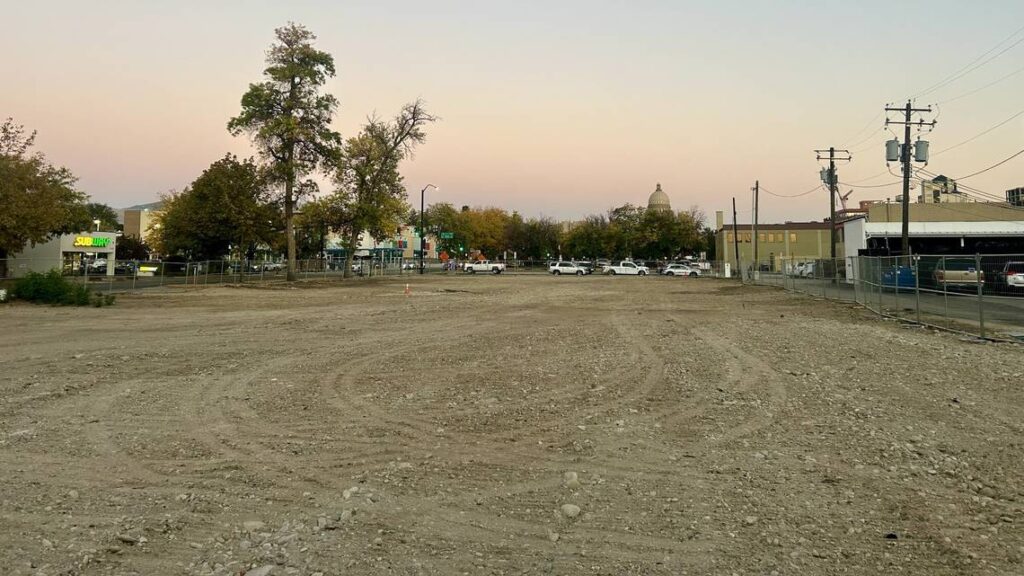An ambitious redevelopment project encompassing three city blocks in downtown Boise, just south of Boise High School, is facing significant challenges that may jeopardize its completion. The project, spearheaded by the city’s urban renewal agency, the Capital City Development Corp. (CCDC), along with several developers, aimed to introduce approximately 30,000 square feet of commercial space alongside 400 apartments in structures ranging from seven to 15 stories. The development included plans for Block 69 North, a seven-story building that would feature workforce housing, and Block 68 South, a 15-story apartment building intended to include a parking garage and a mobility hub linking to State Street, a major commuter route. These blocks were named to reflect Boise’s original 19th-century map.
The developers involved in the project included Edlen & Co. from Portland, deChase Miksis from Eugene, Elton Cos. from Meridian, and the YMCA. The proposal also aimed to relocate the downtown YMCA one block south and to construct a mixed-use building at the current YMCA site. An office building was planned for a small parking lot used by the YMCA. The detailed plan anticipated moving the Y from Block 79 to Block 68, with further development of housing and commercial spaces across the various blocks. However, while these ambitious plans initially garnered excitement, the fate of many components of the project now hangs in the balance.
Recently, it has become evident that the redevelopment might not materialize as intended. Two weeks after a groundbreaking ceremony for the new YMCA on October 30, the CCDC board is set to discontinue most other parts of the project, particularly the workforce housing initiative. The workforce housing concept was designed to assist individuals and families earning between 80% and 120% of the area median income, with rents capped accordingly. For Boise, this would translate to maximum rents of $1,373 to $2,073 for qualifying one-person households. The impending terminations were linked to the developers’ inability to complete the construction by September 2026 when the urban renewal district written into the project will expire, denying them access to crucial CCDC funding.
Economic pressures exacerbated by high interest rates, climbing construction costs, and ongoing labor shortages have contributed significantly to the project’s troubles—issues intensified by competing large projects in the region, including Micron and Meta’s expansions. The estimated cost for Block 68 South and Block 69 North has swelled from around $186 million to $204 million. These surging costs, coupled with the looming deadline imposed by the urban renewal district, prompted CCDC and the developers to attempt renegotiations, but these efforts ultimately fell short. The developers publicly acknowledged that they were no longer prepared to proceed as per the original development agreements.
Challenges continued to compound for the project when a critical financial partner withdrew funding for the 15-story building, hampering the developers’ capacity to push forward. They explored alternate strategies, such as scaling back the proposal to merely include the parking garage and seeking partnerships to maintain at least part of the project’s intentions. However, uncertainty looms over even these modified plans, including the mixed-use building and office space. The developers will retain ownership of the design documents and studies related to the project but will incur losses of $45,000 in deposits for the halted buildings.
Despite the challenges faced by the major components of the redevelopment project, the new YMCA is projected to move forward as planned. Envisioned as a three-story facility, the new YMCA will reportedly include a variety of amenities designed for community engagement and physical wellness. Set to open in the fall of 2026, this portion of the project remains insulated from the broader setbacks experienced by the surrounding developments. Nonetheless, the current situation reflects a landscape of confusion and doubt regarding Boise’s downtown revitalization efforts, exemplifying how economic and logistical hurdles can cause significant changes to urban development initiatives. With ongoing debates and negotiations about the future of Boise’s downtown, community leaders will have to navigate these complexities to foster a viable plan for progress in the area.

